


As we approach 2025, summer camps for kids transform into dynamic spaces that blend traditional outdoor experiences with astounding benefits and innovative learning opportunities. These camps have adapted to meet the changing needs of today’s children while maintaining their core mission of fostering personal growth and development.
Parents seeking enriching activities for their kids will find summer camps in 2025 particularly valuable. These programs combine essential life skills development with exciting adventures, creating an environment where children can thrive both personally and socially. The structured yet flexible nature of summer camps provides the perfect balance for children to develop independence, build confidence, and forge meaningful connections with peers.
The impact of a summer camp experience extends far beyond the warm months of the year. Kids who attend summer camps gain valuable skills, create cherished memories, and develop a stronger sense of self that benefits them throughout their academic journey and personal life.
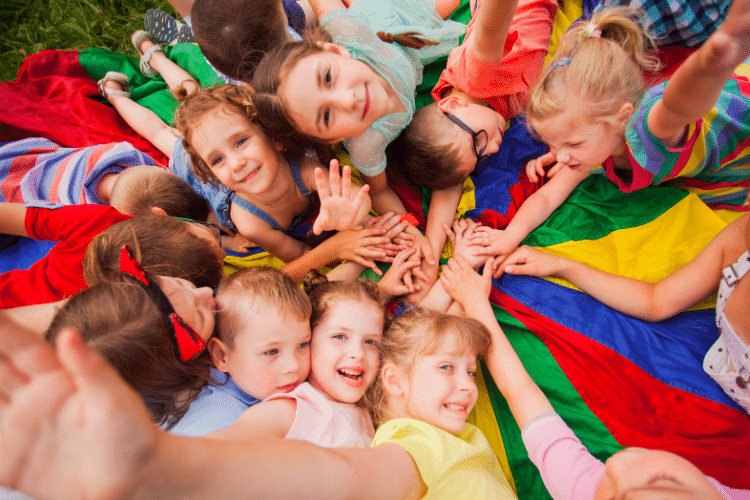
Summer camps are special places where kids can participate in organized activities away from home, usually during school vacations. These immersive environments combine fun, learning, and socializing to provide young minds with one-of-a-kind educational experiences.
The concept of summer camps originated in the 1870s in the United States. They were initially created to give city children a chance to connect with nature and acquire practical skills. As urbanization increased, these camps emerged as a solution, providing children with opportunities to experience the outdoors and develop character through hands-on learning.
Today, summer camps have evolved into various programs that cater to the needs of modern parents. They now include specialized areas of focus such as:
STEM and technology workshops
Arts and creative expression
Sports and athletic development
Environmental education
Leadership training
Parents in 2025 face unique challenges in raising well-rounded children in an increasingly digital world. Summer camps offer crucial opportunities for child growth through hands-on experiences and real-world interactions.
These programs create structured environments where children can develop independence while still having safe boundaries. The emphasis on community building helps kids form meaningful connections beyond their usual social circles, preparing them for future social and professional interactions.
The benefits of summer camps in 2025 go beyond being just another form of childcare—they play a significant role for kids in their personal development. These camps provide children with opportunities to step outside their comfort zones and discover new abilities in supportive settings.
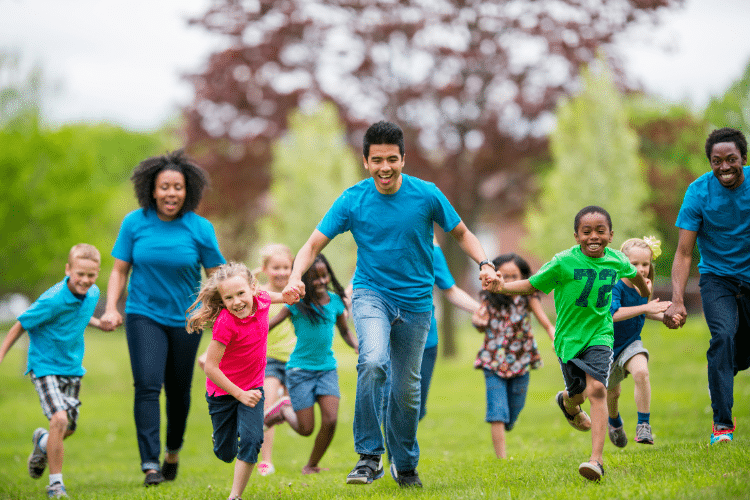
Summer camps are like discovery zones where children can explore various activities such as arts and crafts, robotics programming, and more. Here’s an example of what a typical camp schedule might look like:
Performing arts (theater, music, dance)
Science experiments and technology workshops
Nature exploration and environmental studies
Creative writing and storytelling sessions
Sports and athletic programs
These diverse experiences allow children to try different activities without feeling pressured to commit long-term. For instance, a child who has never picked up a paintbrush may unexpectedly find watercolor talent, while another child may discover a passion for coding through an introductory tech workshop.
The impact of these discoveries goes beyond just the duration of the camp. Many successful professionals attribute their career paths to interests ignited during summer camp experiences. A young camper’s fascination with stargazing at night could eventually lead to a career in astronomy, or a simple cooking class at the camp may inspire someone to become a culinary artist.
Summer camps foster an encouraging environment where trying new things is celebrated, mistakes are seen as learning opportunities, and personal growth takes precedence over perfection.
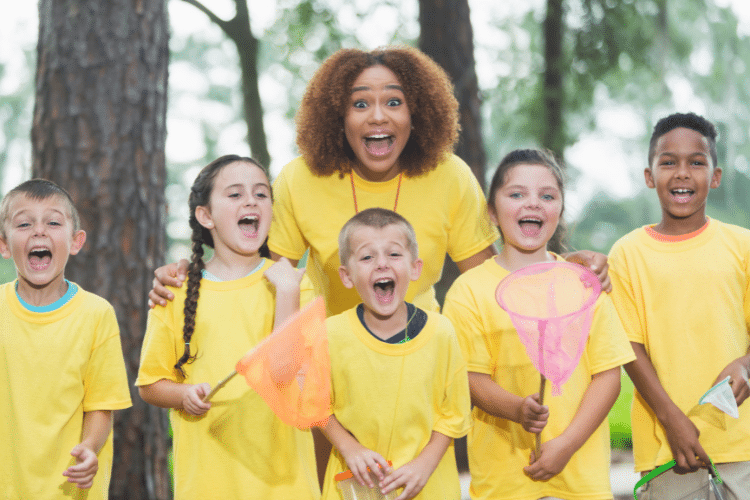
Summer camps create unique social environments where children naturally develop essential interpersonal skills through daily interactions. These immersive settings provide countless opportunities for meaningful peer connections beyond the familiar faces of classmates and neighborhood friends.
The camp environment encourages children to step out of their comfort zones and engage with peers from diverse backgrounds. Through shared activities like team sports, art projects, and group challenges, children learn to:
Navigate new social situations confidently
Practice active listening and clear communication
Develop empathy and emotional intelligence
Build conflict resolution abilities
Express themselves authentically
Unlike structured school settings, summer camps offer organic social interactions during mealtimes, free play, and evening activities. These casual moments often spark genuine friendships built on shared interests and experiences rather than classroom proximity.
Parents can extend these social benefits by incorporating complementary activities throughout the year. Events like Disney on Ice provide additional opportunities for children to practice their social skills in different settings while enjoying magical experiences with new friends from camp.
The friendships formed at summer camps often become lifelong bonds. The intense shared experiences of camp life – from conquering challenges together to sharing late-night conversations – create deep connections that persist long after the summer ends. These relationships help children develop strong social networks and support systems that contribute to their emotional well-being and social confidence.
The social skills gained at summer camp extend far beyond the campground, preparing children for future academic, professional, and personal success in an increasingly interconnected world.
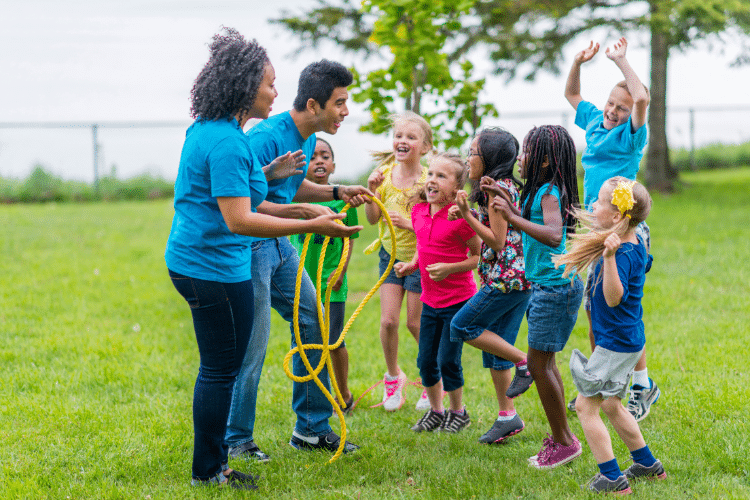
Summer camps are a great place for kids to be active and live a healthy lifestyle in 2025. With organized physical activities, camps provide the perfect setting for children to explore different sports and outdoor activities, all while having a blast.
At summer camp, every day is filled with exciting adventures and opportunities to stay active. Here’s what a typical day might look like:
Swimming sessions: Kids dive into the pool or lake, building their confidence in the water and learning important safety skills.
Team sports: Whether it’s shooting hoops in basketball, kicking goals in soccer, or spiking balls in volleyball, campers engage in friendly competitions that promote teamwork and sportsmanship.
Adventure activities: Campers lace up their hiking boots, conquer rock climbing walls, and navigate through challenging obstacle courses, pushing their limits and discovering new strengths.
Dance and movement classes: From hip-hop to ballet, these classes combine creativity with exercise, allowing kids to express themselves while staying fit.
These fun-filled activities during summer camps not only keep kids entertained but also have numerous benefits for their physical development:
Improved cardiovascular fitness: Running around during games and participating in high-energy activities gets their hearts pumping and boosts endurance.
Enhanced coordination and balance: Balancing on beams, throwing frisbees, and mastering dance moves help develop these essential motor skills.
Stronger muscles and bones: Climbing trees, lifting weights (if age-appropriate), and engaging in resistance exercises build strength from an early age.
Better flexibility and agility: Stretching exercises before sports practices or dance classes improve flexibility while agility drills enhance quick movements.
Increased stamina and energy levels: Regular physical activity increases overall stamina levels, making kids feel more energetic throughout the day.
Many camps design their programs with the goal of making physical activity enjoyable rather than competitive. This means that instead of focusing solely on winning games or athletic achievements, they prioritize fun experiences that encourage participation.
For example:
In team sports like soccer or basketball, coaches emphasize skill development over strict competition rules.
Adventure activities such as hiking or rock climbing are approached as group challenges where everyone supports each other regardless of individual abilities.
Dance classes incorporate freestyle sessions where kids can express themselves without worrying about perfection.
This approach helps children associate exercise with fun experiences rather than pressure to perform well. It also promotes personal achievement by encouraging each child to set their own goals based on their abilities.
The structured yet playful environment of summer camps for kids in 2025 teaches valuable lessons about physical activity that can last a lifetime:
Developing positive attitudes toward exercise: When kids have positive experiences associated with being active at camp, they’re more likely to carry those feelings into adulthood.
Learning proper techniques: Camps often bring in trained instructors who teach campers correct forms for various exercises or sports skills—knowledge that can prevent injuries later on.
Understanding the importance of staying active: Through discussions about health benefits during meal times or evening campfire chats about role models who prioritize fitness — summer camps for kids instill an understanding of why staying active matters.
Building healthy habits: By incorporating daily routines such as morning jogs before breakfast or evening yoga sessions—camps help establish habits that become second nature over time.
In addition to promoting physical activity, summer camps also recognize the significance of nutrition in leading a healthy lifestyle. They understand that what children eat plays a crucial role in supporting their growth, energy levels, and overall well-being.
Camps often integrate nutritional education into their programs through hands-on experiences:
Cooking classes using fresh ingredients: Campers learn how to prepare simple yet delicious meals using seasonal produce—encouraging them to appreciate whole foods.
Garden-to-table activities: If camps have gardens on-site where they grow vegetables or herbs—kids get involved in planting, harvesting, and cooking with those ingredients—creating connections between nature & food.
Group meals demonstrating portion control: During communal dining experiences—counselors can model appropriate portion sizes & encourage mindful eating practices among campers.
Hydration awareness during outdoor activities: Counselors remind campers about the importance of drinking water regularly, especially when engaging in physically demanding tasks like hiking or playing sports under the sun.
By combining knowledge gained from these experiences with practical application at camp—children develop an understanding of healthy food choices that extend beyond their time spent there.
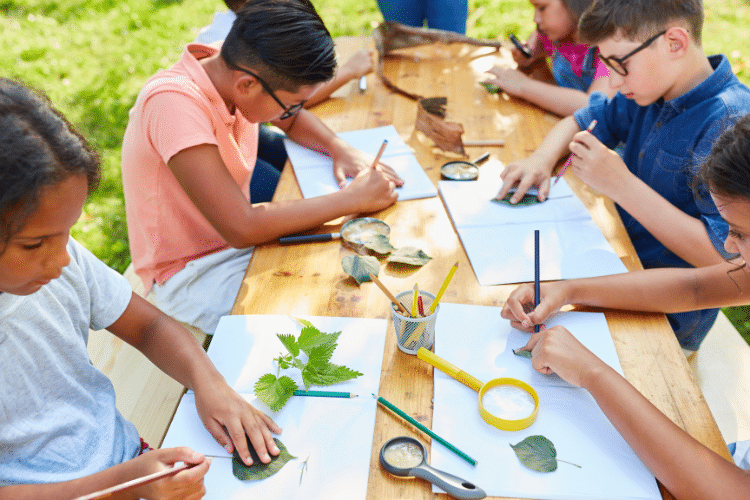
Summer camps play a crucial role in preventing the “summer slide,” a documented phenomenon in which students lose approximately 2-3 months of reading and math skills during summer break. This academic setback can accumulate over the years, creating significant learning gaps.
Modern summer camps integrate educational components through engaging activities that feel nothing like traditional classroom learning. The science behind laughter shows that fun-based learning creates stronger neural connections, making knowledge retention more effective.
Robotics workshops
Coding challenges
Science experiments
Math-based problem-solving games
Environmental research projects
These enrichment activities maintain children’s cognitive engagement while building upon their school-year learning. Research indicates that students who participate in mentally stimulating summer programs show up to 80% better retention of academic skills compared to those who don’t.
Many camps now incorporate project-based learning approaches where children:
Design and build their own inventions
Conduct supervised scientific investigations
Create digital content
Solve real-world mathematical problems
The hands-on nature of these activities transforms abstract concepts into tangible experiences. Children develop critical thinking skills through practical applications, fostering a natural curiosity for learning that extends beyond the summer months.
Brain-stimulating activities at camp create an ideal balance between structured learning and recreational fun. This combination helps children maintain their academic edge while developing new skills in an environment that celebrates both intellectual growth and creative expression.
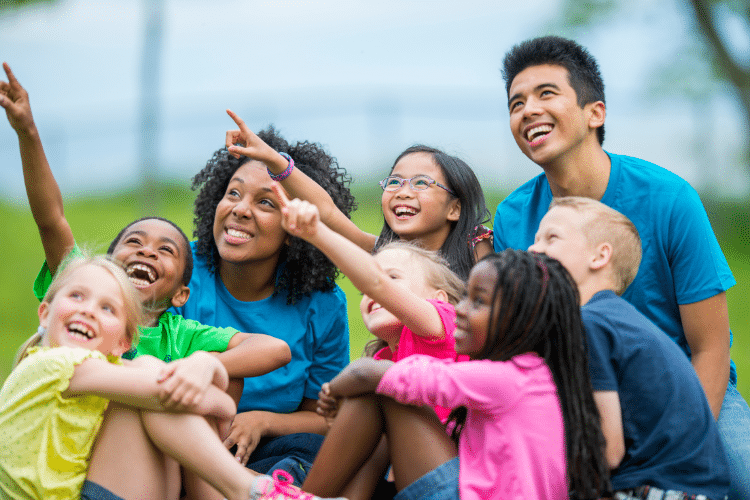
Summer camps create a unique environment where children discover their strengths and build lasting self-confidence. The structured yet supportive atmosphere allows young campers to step out of their comfort zones and tackle new challenges at their own pace.
Camp activities are designed to celebrate both individual and group achievements. From mastering a climbing wall to performing in a talent show, each accomplishment serves as a building block for stronger self-esteem. The immediate recognition of these achievements through badges, certificates, or group celebrations reinforces positive self-image and personal growth.
A typical day at camp might include:
Creative Expression: Art projects, music sessions, and drama activities that encourage self-expression
Skill Mastery: Progressive learning in activities like archery, swimming, or crafts
Leadership Opportunities: Peer mentoring and group leader roles
Public Speaking: Campfire storytelling and group presentations
Supportive camp counselors play a crucial role in fostering self-discovery. They create safe spaces for children to try new things without fear of judgment. A child who might be hesitant to sing at school could find themselves leading campfire songs, while a quiet student might discover their voice as a team captain during Camp Olympics.
These confidence-building experiences extend far beyond the summer months. Children return home with newfound abilities and a stronger sense of self, ready to face new challenges in their academic and social lives. The personal growth achieved at summer camp becomes a foundation for future success and resilience.
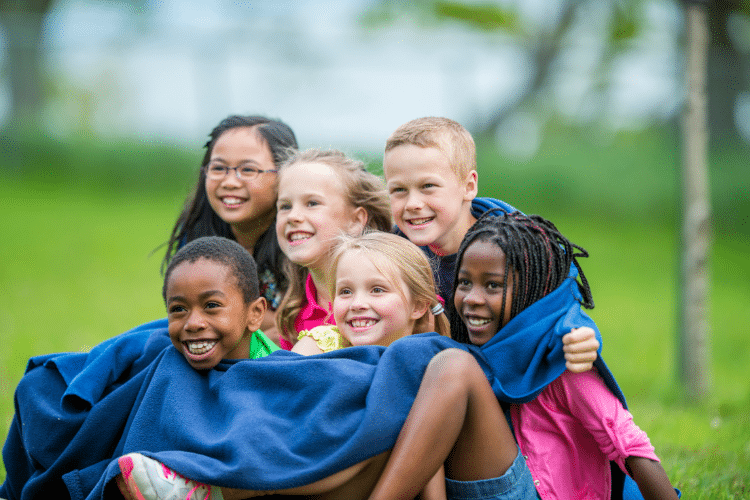
Summer camps for kids create a unique environment where children acquire social benefits and essential teamwork skills through structured group activities. From organizing camp performances to participating in team sports, kids work together to achieve shared objectives. These activities teach children the value of pooling their strengths and supporting one another.
The diverse nature of camp populations exposes children to peers from different backgrounds, cultures, and abilities. This rich collaboration experience helps children develop empathy, respect, and appreciation for different perspectives. Children learn to leverage each team member’s unique abilities through group projects like building shelters or preparing camp meals.
Camp activities mirror real-world scenarios where group dynamics play a crucial role. Children practice:
Active listening during group discussions
Problem-solving in team challenges
Leadership roles in group activities
Conflict resolution through peaceful negotiations
Resource sharing and task delegation
These skills translate directly to future academic and professional settings. Whether working on school projects or participating in sports teams, the collaborative abilities developed at camp prepare children for success in various life situations. The camp environment provides a safe space for trial and error, allowing children to refine their teamwork abilities through hands-on experience.
The impact of these collaborative experiences extends beyond the camp setting. Children apply their newfound team skills in family dynamics, classroom interactions, and community involvement. They learn to value collective achievement alongside individual success, creating a foundation for effective future partnerships.
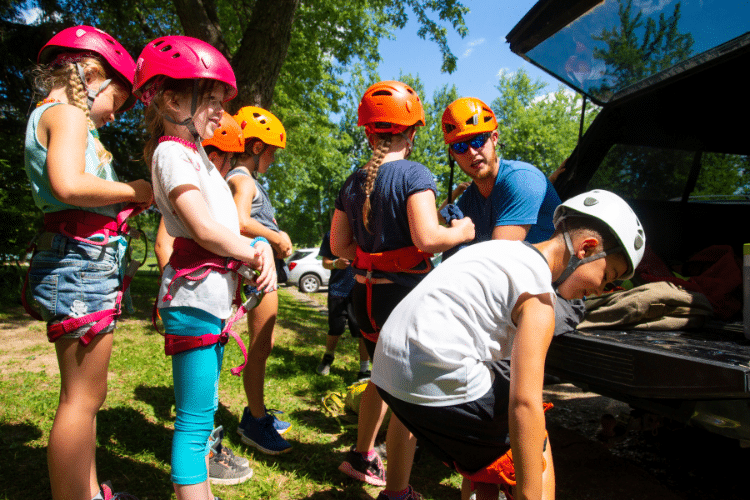
Summer camps for kids in 2025 are gateways to extraordinary adventures and self-discovery. These programs offer children a rich tapestry of experiences that extend far beyond traditional classroom learning.
Modern camps provide diverse activity options:
Creative Arts Programs: Digital animation workshops, music production studios, traditional arts and crafts, theater and performance arts
Adventure Challenges: Rock climbing expeditions, wilderness survival skills, orienteering and navigation, high ropes courses
Cultural Immersion: International cuisine workshops, language exchange programs, global traditions and customs, cross-cultural performances
Each unique experience shapes a child’s perspective and understanding of the world. A young artist might discover their passion for digital design through a multimedia workshop. A timid child could uncover hidden leadership abilities during a wilderness expedition.
These varied experiences create neural pathways that enhance creativity and problem-solving abilities. Children exposed to diverse activities develop adaptability and openness to new ideas – essential skills for future success.
The impact of these experiences resonates long after the camp ends. A child who learns traditional crafts from different cultures gains an appreciation for global diversity. Someone who masters a challenging high ropes course develops a can-do attitude that transfers to academic and personal challenges.
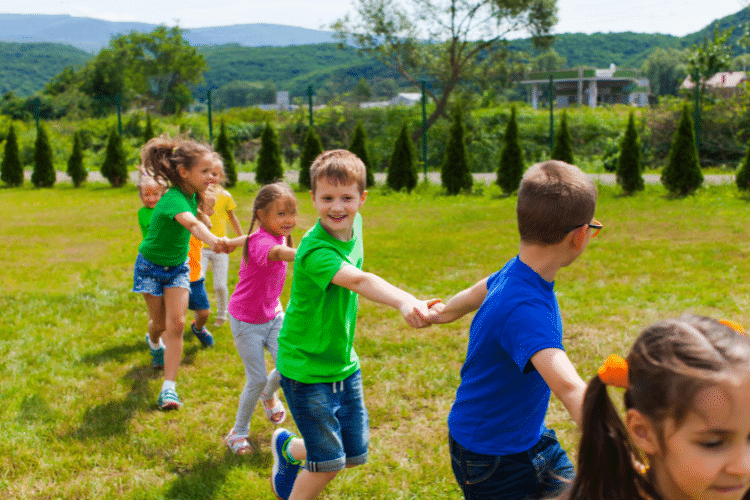
Summer camps are special places where children can form close friendships with their fellow campers and counselors. These camp communities offer a safe space for kids to be themselves while participating in activities and traditions together.
At summer camps for kids, group activities are more than just fun games or exercises and health benefits. They involve meaningful projects that require teamwork and collaboration. Here are some examples:
Planning camp performances
Organizing community service initiatives
By working on these tasks as a group, young campers learn about their individual roles within the larger dynamic of the camp community.
The camp environment plays a crucial role in helping children develop a strong sense of identity and belonging. Here are some ways this happens:
Daily rituals and camp traditions
Shared meals and group discussions
Collaborative problem-solving activities
Community service projects
Cultural celebrations and diversity appreciation
These experiences teach children valuable lessons about community engagement and active citizenship from an early age.
Parents who want to explore different camp communities can make use of virtual open tours. These online previews allow families to get a glimpse into various programs and assess the camp’s culture and values before making a decision.
The friendships formed at summer camps often continue even after the camp season ends. Children have the opportunity to connect with peers from different backgrounds, which promotes inclusivity and broadens their understanding of the community.
These relationships foster skills such as empathy, cultural awareness, and appreciation for diverse perspectives – all of which are important qualities for future leaders in any community.
In 2025, summer camps are expected to focus on creating small supportive communities where every child feels valued and heard. Through structured group activities as well as unstructured social interactions, camps will provide an ideal setting for children to develop a sense of belonging while also building strong ties within their respective communities.
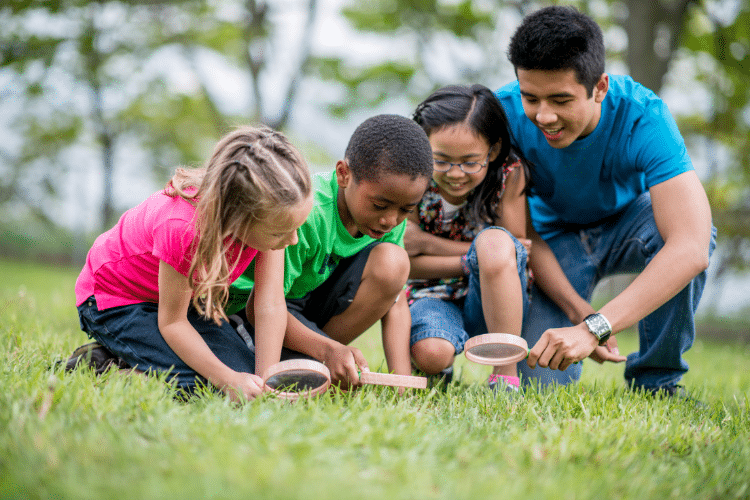
Summer camps create a unique environment where children face and overcome challenges in a supportive setting. These experiences build essential resilience training skills that prepare them for life’s future obstacles.
Camp activities push children outside their comfort zones in controlled, safe environments. Whether it’s conquering a climbing wall, navigating group dynamics during team challenges, or adapting to being away from home, each challenge presents an opportunity for growth. A child who initially struggles with homesickness learns valuable coping mechanisms, while another who fears heights might discover inner strength through guided rock climbing sessions.
Real-world problem-solving scenarios at camp include:
Nature Challenges: Setting up tents during unexpected weather changes
Group Dynamics: Resolving conflicts during team activities
Personal Growth: Managing daily schedules independently
Physical Challenges: Completing obstacle courses or hiking difficult trails
The structured yet flexible camp environment allows children to develop problem-solving skills through hands-on experiences. When a camper faces difficulty starting a campfire or learning a new skill, counselors guide them without solving the problem directly. This approach teaches perseverance and creative thinking.
Children learn that setbacks are temporary and manageable. A failed first attempt at archery becomes a lesson in patience and practice. Difficulty making new friends transforms into an opportunity to develop social skills. These experiences create a foundation of resilience that extends far beyond the camp setting.
The camp environment’s supportive nature encourages children to take calculated risks and learn from their mistakes. Each small victory builds confidence, while each setback teaches valuable lessons about bouncing back and trying again.
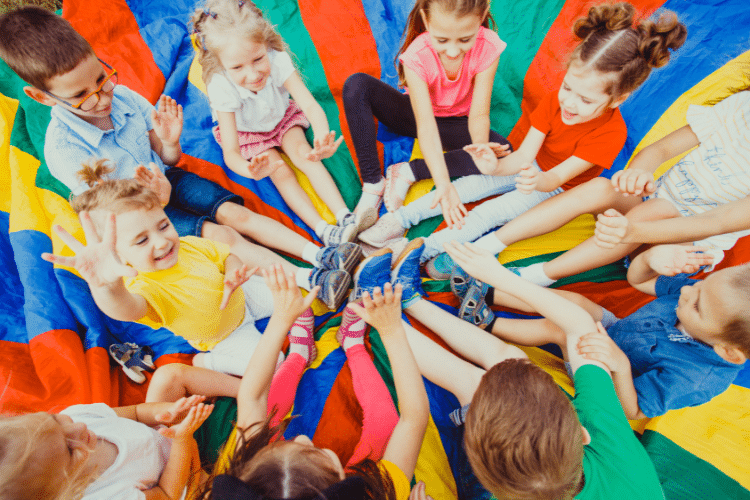
Summer camps for kids create lifelong memories and numerous benefits that shape children’s futures in profound ways. The experiences gained at camp – from conquering fears to forming deep friendships – become building blocks for personal development that extend far beyond childhood.
Parents seeking to invest in their children’s growth should consider summer camps as essential components of their development journey. The combination of structured activities, peer interactions, and guided independence creates an environment where children naturally develop crucial life skills.
Why Every Child Should Attend a Summer Camp for Kids in 2025 isn’t just a suggestion – it’s an opportunity to give your child a head start in life. The skills, confidence, and memories gained at camp become invaluable assets throughout their academic journey and future careers.
Ready to give your child these transformative experiences? Visit 4kids.com to explore our comprehensive directory of summer camps. Find the perfect program that aligns with your child’s interests and sets them on a path to success.
Categories :
Tags :
We believe in building & supporting the community and that finding the resources and things to do for your kids should be easy. 4kids.com is a FREE online resource guide for families with kids in a city near you.
View All PostsNotifications